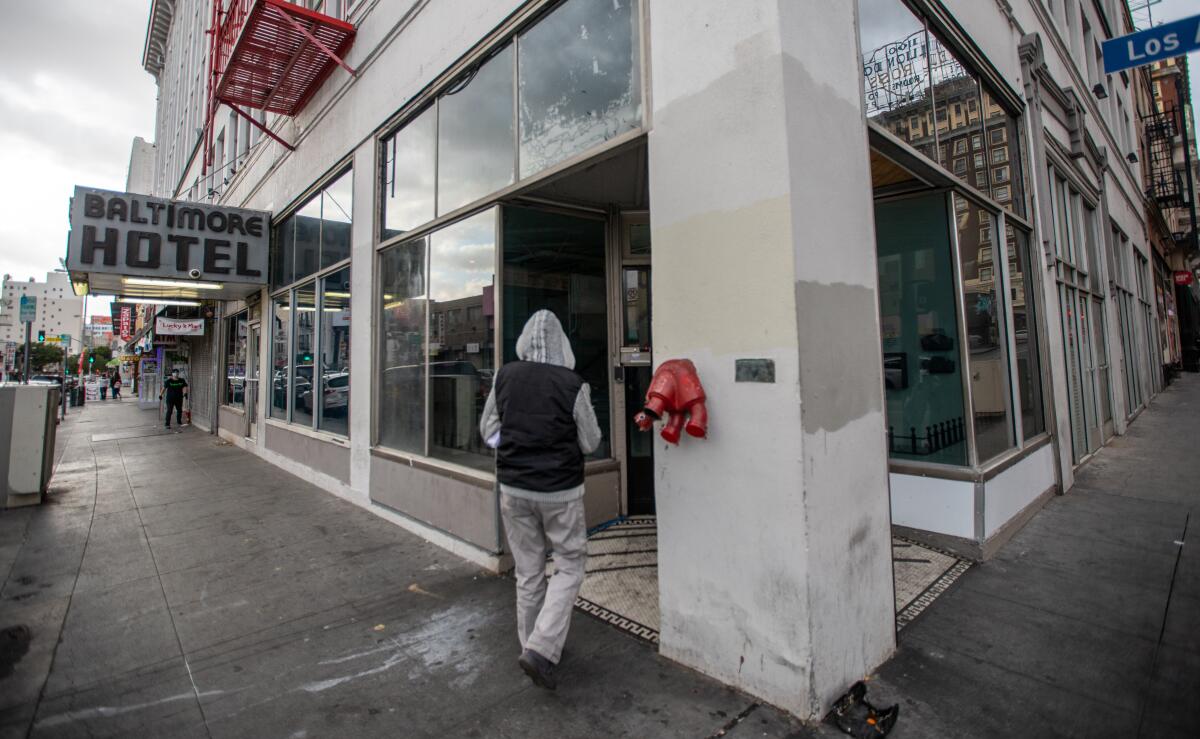Controversial landlord wants to buy six more troubled Skid Row properties
California Politics
Liam Dillon April 16, 2024
A half dozen
homeless housing
properties that are owned by a failed Skid Row landlord should be sold to the AIDS Healthcare Foundation, the
court-ordered
receiver o
v
erseeing the buildings said, despite the Hollywood-based nonprofit’s foundation’s own problematic history of operating low-income housing.
The
foundationHollywood-based nonprofit
has agreed to pay $27 million for six properties owned by the Skid Row Housing Trust, which financially collapsed last year. Under the deal, the foundation will continue to operate the buildings, half of which are single-room occupancy hotels and the other half efficiency apartments, as permanent housing for formerly homeless residents.
The foundation had the highest bid for the properties, and the sale is in the best interest of all parties, including tenants and creditors,
wrote
Kevin Singer, founder and president of Receivership Specialists,
wrote
in a document filed Monday in Los Angeles Superior Courton Monday.
The purchase, which could be finalized as soon as next month, would
further
accelerate the foundations rapid growth as a
homeless housing
landlord
for the formerly homeless
. The foundation
takes in has revenue of
$2 billion a year
in revenue
largely from its network of pharmacies. Since 2017, it
hass
bought 16 properties with about 1,500 units in and around Skid Row.
The
half dozen
Skid Row Housing Trust buildings the Boyd, Hart and St. George single-room occupancy hotels and the Lincoln, New Carver and Rainbow apartments would add
another
415 units to the foundations portfolio.
The foundation
has touted that it’s says it has
stepped in to address chronic homelessness where public agencies, the private market and other nonprofits have failed, upping the occupancy in its buildings by almost 200% and taking nearly 1,000 people off
the
streets and into permanent housing.
But the foundations
existing
buildings have been beset with heating, plumbing, elevator and electricity failures and vermin infestations. In some cases,
the buildings have seen
a surge in tenant complaints and crime after the foundation took them over, The Times found in an investigation published last fall.
These troubles prompted the state Department of Housing and Community Development to send a letter to the receiver last month saying the foundation would not be a suitable owner and operator for the trust buildings. A spokesman for the department on Monday told The Times that its concerns about the foundations potential ownership remain.
The Los Angeles City Council is scheduled to discuss the receivership in a closed
session
hearing
on
Tuesday.
The proposed sale
to the foundation
comes as Singer and city officials are trying to wind down the year-old receivership that began when the trust, once considered a nationwide model for housing formerly homeless residents, declared in February 2023 that it could no longer pay its bills and largely abandoned its 29 buildings and 1,500 tenants.
The receiver
shipalready
has spun off 11 of the trusts newer and better-maintained properties to
the
more established nonprofit affordable housing providers LA Family Housing and People Assisting the Homeless, or PATH
, and hopes to transfer one more
. Singer has put the remaining
17
trust buildings, many of which are older single-room occupancy hotels without private bathroom facilities, up for sale.
In addition to the trust, numerous other owners of single-room occupancy hotels,
which are
seen as last-resort housing for the citys most vulnerable, have struggled in recent years with low public subsidies and a tenant population beset with mental health and addiction problems that has been prioritized for permanent housing.
Last fall, city
housing
officials put forward a plan for the local housing authority to take control of the remaining trust properties and operate them until they could be turned over to developers who would tear down and rebuild them as efficiency apartments for homeless residents.
But that proposal has fizzled amid mounting budget pressures for the city and state. The focus turned instead to salvaging the buildings and potentially recouping some of the nearly $40 million in financing the city has authorized for the receivership.
In Mondays court filings, Singer said three other bidders, whom he declined to name, made substantive offers for the trust portfolio. But those offers were lower than the
AIDS Healthcare Foundation’sfoundations
or involved complicated financing
that he believed was not viable.he didnt believe was viable.
Of the foundations $27-million offer, $5 million would fund ongoing repairs at the six buildings, and $10 million would repay part of the citys debt
;, with
the rest
would go going
toward continued receivership operations until the remaining properties
arewere
sold. Singer said hes continuing to negotiate with two other bidders to purchase
another
six
other
buildings.
Los Angeles Superior Court Judge Mitchell Beckloff, who had been in charge of the receivership case, retired
earlier
this month. Singer is asking Beckloffs replacement, Stephen Goorvitch, for a hearing to approve the sale of the
six
buildings to the foundation no later than May 10.
Without an influx of cash, Singer wrote in his filings, the receivership will run out of money in May.
A key issue in negotiations with the foundation has been the availability of social services for tenants. Residents in trust buildings have been entitled to receive case management, mental health and other services as part of their voucher programs. But the foundation does not offer services
of its own
in many of its
existing
buildings, citing the cost
s
.
The purchase and sale agreement calls for the foundation to maintain an outside property management firm for up to six months and agree that it has an ongoing responsibility to provide unspecified social services to tenants. Ultimately, the agreement says, the foundation intends to operate and manage the properties with its own staff. The agreement also calls for a two-year moratorium on enforcing code violations that
still
exist at the properties at the time of the sale so that the foundation can continue rehabilitation efforts without penalty.
A foundation spokesperson declined to detail the nonprofit’s social service plans for the buildings or
to
answer other written questions from The Times.
Clara Karger, a spokesperson for Mayor Karen Bass, said the city has emphasized to the receiver that any future owner and operator of trust buildings must ensure that tenants receive comprehensive social services.
“It is paramount that the selected buyer commit to long-term affordability covenants and provide property management services that address both the needs of vulnerable residents and the maintenance and investment that will be required to manage these buildings,” Karger said. “The city has conveyed clear expectations that wraparound services be delivered on site at all of the buildings.”
Mondays agreement comes as city regulators and the courts are
scrutinizing providing greater scrutiny of
the
AIDS Healthcare Foundation’sfoundation’s
housing activities.
Later this week,
The
Los Angeles City
Ethics Commission
this week
is scheduled to discuss leveling $22,250 in penalties against the foundation and one of its lead housing organizers, Susie Shannon, for
atheir
failure to register and report their lobbying in 2023, according to proposed settlement agreements between
the parties.Shannon, the foundation and the commission.
Shannon lobbied city officials on behalf of the foundation on various affordable housing issues without publicly disclosing her actions, as required by city law, the settlement states. A foundation spokesperson said Shannon did not lobby on the trust receivership.
Currently,
The foundation is facing at least 10 lawsuits in state and federal courts over conditions in its buildings, including class-action cases detailing habitability concerns in the Baltimore and Madison single-room occupancy hotels in Skid Row.
Earlier
This month, it won $1.5 million in damages through a default judgment against Kameron Segal, the prior owner of the Madison, after the foundation alleged
Segal that he
failed to disclose the condition of the five-story buildings chronically broken elevator prior to the sale in September 2017. Its unclear if the foundation will be able to collect from Segal, who didn’t defend himself in the lawsuit and whose companies have been in bankruptcy. A foundation attorney said in a statement that the decision shows the nonprofit isnt to blame for the buildings elevator problems and noted that it has spent $600,000 on repairs.
Despite the spending, the Madisons elevator
still
suffers from frequent lengthy outages, including as recently as last month. Last year, the foundation agreed to pay $832,000 to 13 residents and undisclosed amounts to four others who had sued over the elevator.
In a separate decision this month, a Los Angeles Superior Court judge threw out portions of the Madison class action case against the foundation. But he noted that some reduction of the agreed rent is likely due to tenants as restitution for alleged plumbing
, and
electrical
problems
, unsanitary conditions and other failures in shared portions of the building.
That the tenants lived in subsidized housing at below-market rents does not mean that they were obligated to pay their full agreed rent if there were material deficiencies in the condition of the common area or other lapses, Judge William Highberger wrote in the ruling.
Times staff writer Doug Smith contributed to this story.





